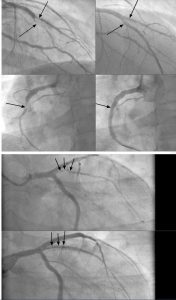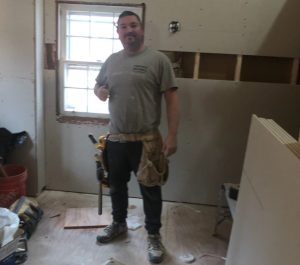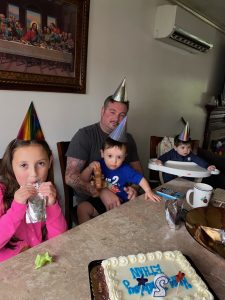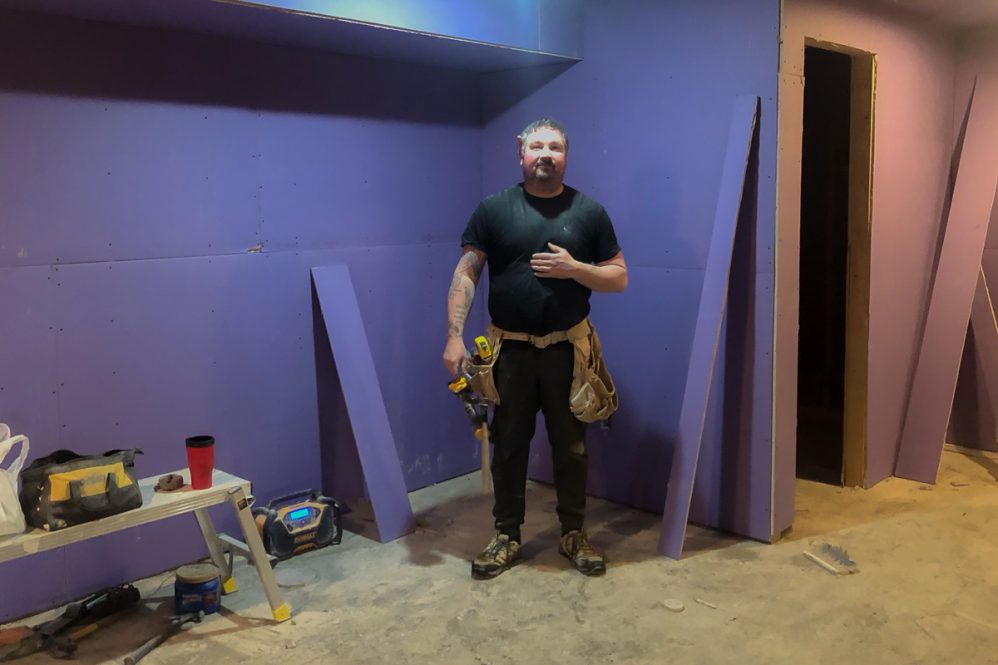Fred Veilleux, 40, of East Hartford and originally of Quebec, is a husband and father of three young children. He’s the picture of youth and strength. In fact, he lifts 3,000 lbs. a day working for his cousin’s Friendly Drywall construction company.
 But this spring he started to experience some slight chest pain and thought it was just muscle-related pain from his construction work. “I didn’t think anything of the light chest pain and just kept working through it.”
But this spring he started to experience some slight chest pain and thought it was just muscle-related pain from his construction work. “I didn’t think anything of the light chest pain and just kept working through it.”
But one evening weeks later his chest pain got very intense. “It was the sharpest pain. It felt like someone was punching me in my chest,” he recalls.
He then sprang into action.
The Calhoun Cardiology Center at UConn Heath urges everyone to be familiar with the warning signs of a heart attack, never ignore these signs, and always seek medical attention right away. It could save your life.
Heart attack warning signs:
- Sudden chest discomfort.
- Chest heaviness or tightness.
- Shortness of breath or constricted breathing.
- Sweating or lightheadedness.
- Nausea.
- Indigestion, heartburn, or an esophageal burning sensation.
7 cardiovascular disease prevention tips:
- Do not smoke.
- Keep a healthy body mass index (BMI should be less than 25).
- Be physically active (Moderate exercise should occur 3-5 days a week even if just 30-40 minutes of brisk walking).
- Maintain an optimal diet.
- Control your total cholesterol (Less than 200 is ideal).
- Control your blood glucose(To prevent or manage diabetes a fasting glucose level of less than 100 is ideal).
- Control your blood pressure(Less than 120/80).
“I’m going to drive myself to UConn Health,” he said to his wife Andreza but then the pain picked up. “I’m calling an ambulance.”
The ambulance brought him to the closest area hospital as a safety measure but all the tests both in route to the hospital and at the Emergency Department surprisingly came back normal.
A week later Veilleux followed up with UConn Health for a checkup and his primary care doctor ordered a precautionary stress test to be safe.
 “During the stress test I started to have a heartburn type feeling in my chest, and the heart doctor told me to stop running after just 5 minutes,” recounts Veilleux.
“During the stress test I started to have a heartburn type feeling in my chest, and the heart doctor told me to stop running after just 5 minutes,” recounts Veilleux.
“His stress test results were very concerning,” says Dr. Peter Schulman his cardiologist at UConn Health’s Calhoun Cardiology Center. “I shared with him that I suspected that he had several blocked arteries and ultimately he may be a candidate for open-heart surgery.”
Veilleux was shocked.
“But I’m only 40 years old. I never thought anything would be wrong with my heart. And I have to work. I run my own business. The recovery time from open-heart surgery would be at least 6 months before I could return to my drywall construction’s heavy lifting,” said Veilleux.
Schulman ordered a diagnostic angiogram test to have the Cardiac Catheterization Laboratory at UConn Health take a closer look inside Veilleux’s heart arteries to confirm the suspected diagnosis.
 Interventional cardiologist, Dr. Michael Azrin, director of the Calhoun Cardiology Center’s Cardiac Cath Lab uncovered that Veilleux’s two main heart arteries were severely blocked. The left main artery was blocked 95 percent while his right main artery was 90 percent blocked.
Interventional cardiologist, Dr. Michael Azrin, director of the Calhoun Cardiology Center’s Cardiac Cath Lab uncovered that Veilleux’s two main heart arteries were severely blocked. The left main artery was blocked 95 percent while his right main artery was 90 percent blocked.
During the angiogram Azrin asked Veilleux: “Stents or open-heart surgery?” Veilleux said: “I’d rather have stents!”
Azrin responded: “Well we have a big job to do.”
The Cath Lab team proceeded right away to successfully place 7 stents over several hours to open up his heart blockages to prevent a future heart attack and avoid the need for open-heart surgery.
“It was such a relief to be able to avoid open-heart surgery at my age. I was only home for a week recovering and then was able to go right back to work,” said Veilleux. “I’ve been feeling great!”
 Interestingly, a then interventional cardiology fellow named Dr. Fadi Fahad, who also had lived in Canada, in addition to Veilleux’s preferred language of English additionally spoke some French to him during hospital rounds. “The doctor kindly told me in my native French, if you want to see your three kids grow up you need to stop smoking and eat healthy. Since that day I quit smoking.”
Interestingly, a then interventional cardiology fellow named Dr. Fadi Fahad, who also had lived in Canada, in addition to Veilleux’s preferred language of English additionally spoke some French to him during hospital rounds. “The doctor kindly told me in my native French, if you want to see your three kids grow up you need to stop smoking and eat healthy. Since that day I quit smoking.”
Veilleux is very grateful for his second chance and restored heart health.
“I was a ticking time bomb. I was on the verge of having a heart attack at any time – and due to the severity of my blockages it would have been hard for doctors to save my life. Thank God I went for my checkup, and followed up with my stress test and angiogram. I am very lucky.”
Since his June minimally-invasive procedure Veilleux is back to his daily heavy lifting at work of more than a ton and a half – and keeping up with his three young children.
“The doctors at UConn Health saved my life and my livelihood,” he exclaims.
His message to other young men, fathers, and men of all ages: “Don’t wait! Go see your doctor once a year. Don’t think because you’re a guy you are made too tough. Don’t think you’re invincible. If I would have gone to the doctor sooner, I would have known my heart disease risk factors sooner such as high cholesterol, and maybe even prevented these heart blockages.”
 “I tell everyone we all are like cars. We need checkups from time to time and sometimes even some part changes too,” says Veilleux. “If you develop heart blockages, don’t worry because they are curable. But you do have to go get checked at the doctor each year to find out about them – and to get any fixed.”
“I tell everyone we all are like cars. We need checkups from time to time and sometimes even some part changes too,” says Veilleux. “If you develop heart blockages, don’t worry because they are curable. But you do have to go get checked at the doctor each year to find out about them – and to get any fixed.”
He stresses: “UConn is the best hospital. The doctors saved my life. It’s an amazing place and the heart specialists are one-of-a-kind. They all are an amazing team.”
“We are so happy to have had the opportunity to help diagnose Fred’s heart blockages before a heart attack could strike, get his heart issue fixed quickly, and get him back as soon as possible to both his young family and his job he loves most,” says Schulman.



